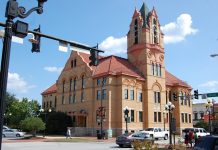By Stan Welch
Anderson County Council gave second reading approval to the 2016-2017 budget as proposed, despite several recommendations from the District Two Council member.
In a segment of the agenda set aside for Councilwoman Gracie Floyd’s thoughts on the budget, she raised the issue of a one cent sales tax to help defray the costs of roads and bridges. She quickly muddled the issue, however, by repeatedly confusing the one cent tax, which would be a local option sales tax, with the revenues dedicated to roads and bridges, with the two cent hospitality tax.
The hospitality tax is a tax on all prepared foods sold within a given jurisdiction, and those revenues are dedicated by law to recreational and tourism related activities. The unincorporated areas of the county are the only areas currently not imposing that tax. The hospitality tax can be implemented by a vote of the appropriate legislative body, such as a town or county council, while the local option sales tax must be proposed as an ordinance by the Council, and then passed by referendum.
Floyd persistently referred to the one cent hospitality tax as a source of revenues that could be used to pay for such items as the maintenance costs at the civic center, or the Broadway Lake community center. Her theory was that the funds freed up in that manner could then be used to pave more roads and repair more bridges.
County Finance Director Rita Davis, when asked by Floyd, estimated that a county wide hospitality tax would generate approximately two million dollars a year. If such a tax was enacted, the various municipalities would not be affected, but would continue to collect their own tax in their municipal limits.
District One Councilman Francis Crowder repeated his trilogy of options to generate additional funds for infrastructure. “We can do nothing; we can propose the one cent sales tax; or we can impose a road fee, which a number of counties in the state have adopted.
For her part, District Seven Councilwoman Cindy Wilson reiterated the fact that the General Assembly continues to refuse to meet its statutory obligation to follow the existing legislative formula for aid to subdivisions. Those levels of funding that the counties are supposed to receive were first suspended in 2008 when the economy took a serious tumble, affecting tax revenues.
Wilson pointed out that several years ago, when the economy began to rebound, the General Assembly failed to resume the prescribed funding levels. “We are being shorted by about four million dollars a year in our aid to subdivisions funding. This Council has worked very diligently to cut and shave and reduce spending and it is getting very difficult to continue to do that without cutting services. I encourage the citizens to contact the members of the county delegation and ask them to meet their obligations.”
She also pointed out that the costs of providing health insurance coverage for employees and their families is approximately seven million dollars a year. “I would hate to see us ask our people to pay their own premiums, but I don’t know how much more we can stand.”
The Council also gave second reading approval to an ordinance that would prohibit heavy truck traffic from Breazeale, Cheddar and Hopewell Roads. (See related story elsewhere in this issue of the Journal.)















